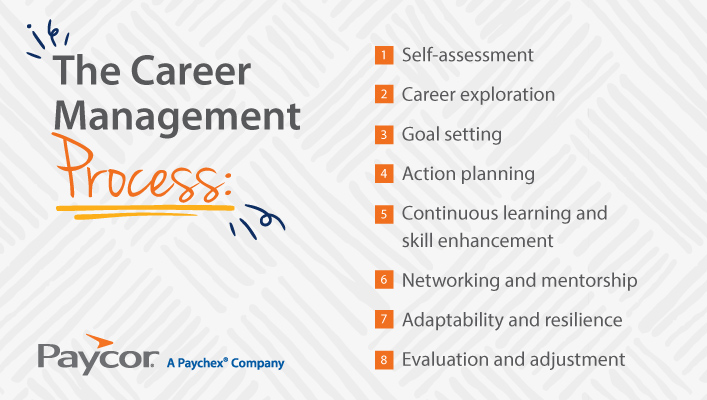As an HR professional or business owner, you play a pivotal role in guiding others along their career paths. Have you considered how your approach to career management can empower employees to take charge of their growth? It’s never too late to help someone reset their direction or map out their next steps. By fostering a culture of intentional career planning, you give your team the tools to make strategic decisions and treat their professional journey with the same care as a CEO would their company.
Are you ready to support your employees as they shape their futures? There’s no better time than now to explore resources and strategies that make career management a shared priority.
What is Career Management?
Career management is the proactive, continuous process of shaping the path of your professional career. For example, the end game for an employee is achieving long-term career satisfaction and success, which can reap results that advance the business. The career management process involves self-assessment, setting clear goals, and acquiring new skills while adapting to industry changes.
What’s the Role of Career Management in HR?
The role of career management in Human Resources is both valuable and strategic, creating as a bridge between individual employee growth and organizational success. HR departments are responsible cultivating a workforce that has the skills to meet current demands, as well as prepare them for future challenges.
So, being integral in developing, fostering, and maintaining a career management process – aligning employees’ career management efforts with company objectives – is crucial. Why?
A Pew Research Center survey found that only about 26% of workers were highly satisfied with opportunities for promotion, a drop of 7% from its previous survey.
Importance of Career Management
In competitive labor market, a high-functioning career management process could make a significant difference in recruitment and retention. However, this doesn’t just mean providing access to training courses. Career Management involves building a holistic program for professional development.
A study found that 94% of employees would stay longer at companies that invest in their career growth (Novoresume). And it’s hard to overlook a business that is fostering employee growth: The income for companies with well-developed employee training programs is 218% higher per employee than companies without formalized training (Thrive Sparrow).
Components of Career Management
There are many components of career management. These include:
- Self-assessment
- Career exploration
- Goal setting
- Action planning
- Continuous learning and skill enhancement
- Networking and mentorship
- Adaptability and resilience
- Evaluation and adjustment
The Career Management Process

Successful career management is a continuous, step-by-step process that empowers employees to take proactive steps to shape their career path. HR should emphasize the value of growth, adaptation, and fulfillment when assisting employees with the process.
Self-Assessment
Begin by encouraging employees to reflect on their strengths, development areas, skills, and core interests. HR can facilitate this process by providing structured tools like personality assessments or guided journaling exercises. The goal is to help individuals clarify what motivates them, what types of roles align with their talents, and the kind of work environments where they thrive.
Career Exploration
With a clearer sense of each employee’s profile, HR can support them in exploring career paths and roles within the organization that match their skills and aspirations. This may involve sharing information about different departments, growth opportunities, and the competencies required for advancement. HR professionals can also connect employees to mentors or organize informational interviews, giving them access to real-world insights from colleagues in roles they’re considering.
Goal Setting
Work with employees to translate their aspirations into actionable objectives. Encourage the use of SMART criteria when setting both short- and long-term career goals—ensuring each target is specific, measurable, achievable, relevant, and time-bound. This approach provides structure and motivation while aligning individual ambitions with organizational needs.
Action Planning
Guide employees in building a concrete action plan to reach their goals. Outline the necessary steps, such as training, upskilling, or seeking out stretch assignments. HR can provide resources, suggest relevant development opportunities, and help employees set deadlines for each milestone. This is also the time to advise on resume-building and networking within and beyond the organization.
Implementation and Development
Support ongoing learning and skill development, recognizing that the talent landscape is always changing. HR’s role is to create opportunities for employees to participate in training, attend workshops, and expand their networks. Regular check-ins can help employees stay engaged and on track as they work toward their goals.
Evaluation and Adjustment
Establish regular review points to assess progress and recalibrate as needed. Facilitate honest conversations around what’s working and where there are obstacles. If goals or interests shift, help employees adjust their plans accordingly. This ensures that career management remains a dynamic process, responsive to both individual growth and the evolving needs of the organization.
Benefits of Effective Career Management
Effective career management programs benefit both organizations and their people. When companies invest in employee growth, everyone wins: businesses gain a stronger workforce, and employees feel empowered to shape their futures. Here’s a quick look at the advantages for each side:
For Employers
- Higher employee retention and lower turnover costs
- Increased productivity across teams
- A more engaged workforce
- Stronger internal talent pipeline and better succession planning
- Businesses with robust learning programs are 52% more productive and see retention rates as high as 57%, compared to 27% for companies with only moderate learning cultures (Novoresume)
For Employees
- More control over professional growth
- Access to skill development and advancement opportunities
- Feel valued and supported by their organization
- Greater engagement and commitment
- Improved job satisfaction and motivation
- Enhanced employability and adaptability in a competitive job market
Challenges of Career Management
For all the benefits that a career management program provides, employers could face serious challenges in setting one up and keeping it running. Here are three potential hurdles:
1. The Lack of Buy-in and Training
If leadership and frontline managers don’t get behind a program 100%, it’s not going to succeed. One issue might be managers not seeing the value of career management. They could also lack the skills needed to help contribute to the process (e.g., inability to conduct meaningful career conversations). Limited time and resources are other roadblocks to building a program. These shortcomings might leave employees with the perception that the program is not a priority.
2. Limited Resources and Budget Constraints
Any career management process worth having requires time, money, and people to establish training programs, mentorship initiatives, technology platforms for tracking, and more. Smaller businesses that might work with tighter budgets could find allocating the resources more challenging.
3. Aligning Employee Aspirations with Organizational Needs
Striking a balance between an individual’s career aspirations and the company’s needs isn’t easy. If an employee has goals that don’t align with the strategic direction of the business, then employers need to communicate, effectively, any current and future skill requirements while identifying alternative paths and managing expectations. This will prevent any disillusionment limit potential turnover.
How Can Employers Support Employee Career Management?
Employers and HR personnel strive to develop and sustain and thriving workforce that has the skills to meet today’s demands and is willing to learn skills to address future demands. There are a number of ways they can support an employee’s career management efforts.
Establish Clear Career Paths
Employers and HR managers should define and communicate potential employment career paths within the organization, explaining to employees how they can grow and move from one role to another. With more transparency, employees may visualize better their future.
Provide Learning & Development Opportunities
Once HR identifies skill gaps, the focus should be on creating training programs, workshops, and e-learning modules to address these needs. For example, a program can be established on leadership development for high-potential employees or an online course on data analytics for teams that need to upskill can be produced.
Facilitate Mentorship and Coaching
Businesses sometimes have formal mentorship programs that pair veteran employees with those seeking guidance. It offers an opportunity for managers to regularly provide feedback and identify opportunities. An example, anew manager might be assigned a senior leader as a mentor to help understand their new responsibilities.
Provide Resources and Tools
There are platforms such as Learning Management Systems (LMS) that offer an abundance of learning content, while also providing career counseling, assessment tools, and access to industry insights.
Use Succession Planning Effectively
A critical function in the success of a career management program is identifying key roles within the business and then developing a pipeline of internal talent when a vacancy arises. The establishment of clear advancement opportunity creates business continuity. An example of this would be when HR identifies potential successors for a senior executive role and then puts them through specific development programs to prepare them.
How Paycor Helps with Employee Career Management
Paycor offers a comprehensive suite of talent management solutions that includes features designed to support employee career management, primarily through their Talent Development module. Here’s how our software helps:
- Career Management Software: Paycor Paths is designed to help businesses support employee growth and development. It provides tools for employees and supports continuous development and coaching conversations to help managers guide employees.
- Learning Management System (LMS): Paycor’s LMS provides opportunities for skill development, compliance training, and offering personalized learning paths to address skill gaps and prepare employees.
- Talent Review and Succession Planning: This software helps identify high-potential employees and assess their readiness for key roles. It aids in defining role profiles, identifying future roles, outlining growth opportunities, and facilitating internal movement.
Implement Effective Career Management with Paycor
The right software empowers HR leaders to focus on strategy. The Paycor HCM Software modernizes every aspect of human capital management from HR and payroll to benefits administration and talent development.
Customers that switched software providers to Paycor streamlined their businesses by reducing the number of HR tools and people management systems they were using by 184%.
Learn why 30,000+ customers choose Paycor for their HR software of record. Request a guided product tour.
Career Management FAQs
Still have questions on career management? Read on.
Why is Personal Career Management Important for Workers?
Personal career management empowers workers to shape their professional journey, aligning their skills and interests with future employment opportunities. This proactive approach enhances their employability, increases job satisfaction, and makes them adaptable in an ever-evolving job market.
How Can Career Management Improve Employee Performance?
Career management aligns individual growth with organizational needs, which fosters skills and, therefore, and higher engagement. When employees see a clear path for advancement and receive support, they are more motivated, productive, and committed to excelling in their roles.
What is the difference between career planning and career management?
Career planning focuses on the individual worker who assesses their skills, interests, and aspirations to define personal career goals and outline steps to achieve them. In contrast, career management is an ongoing process that encompasses individual career planning and with company support that integrates employee development with the company’s strategic needs. While planning is the “what” and “how” for an individual, management involves the continuous execution, adaptation, and alignment of those plans within an organizational context.








